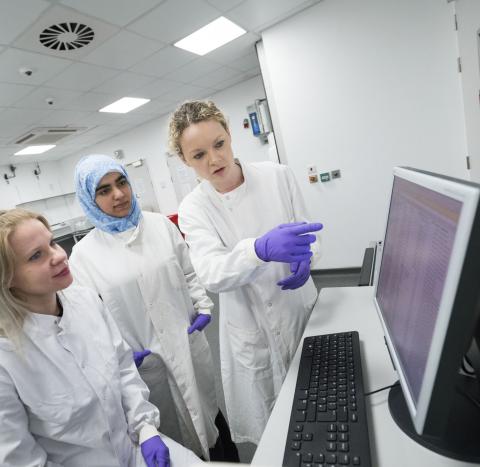Dr Elizabeth Moore led this investigation into novel methods for the earlier and more precise detection of ovarian cancer.
Project background
Two-thirds of women with ovarian cancer are diagnosed too late, once the cancer has already spread, making treatment more difficult. There is currently no proven screening test for ovarian cancer. The cervical smear test does not detect ovarian cancer and a complete diagnosis is only possible through investigative surgery. If an accurate test could be developed to detect ovarian cancer early, it would have a significant impact on women receiving treatment as soon as possible, thereby increasing their likelihood of survival.
Research results
Dr Moore showed that very small levels of DNA from ovarian tumours can be detected in the circulating blood of women with newly diagnosed ovarian cancer, including in women with early-stage disease. These findings could help overcome current limitations of similar testing, allowing for a more accurate way to diagnose ovarian cancer earlier. Dr Moore's approach has strong potential for being translated to the clinic, due to its low cost and scope for analysing a high volume of samples.
Dr Moore also demonstrated that the sensitivity of this test can be increased by analysing differences in the size of DNA fragments from cancer cells in comparison to normal cells. Unlike a tumour biopsy, testing for tumour DNA in blood samples would be a non-invasive test for cancer diagnosis, and could in future work for an ovarian cancer screening process.
Why is this research important to those affected by ovarian cancer?
Whilst considerably more research is required to develop an accurate, reliable method for diagnosing ovarian cancer early, this research paves the way for such a test. Dr Moore has had the results from her research published in the highly respected journal Science Translational Medicine.
Dr Moore was the first recipient of the highly prestigious joint Target Ovarian Cancer and Medical Research Council Joint Clinical Research Training Fellowship, a programme dedicated to training the ovarian cancer clinical researchers of the future. We are delighted that our joint fellowship with the Medical Research Council has made such strides towards the earlier diagnosis of this devastating disease.
Fact file
Researcher: Dr Elizabeth Moore
Institution: University of Cambridge
Project dates: October 2014 to October 2018
Funding awarded: £100,000
Project status: complete
Key publications: Mouliere F, et al, (2018) Enhanced detection of circulating tumor DNA by fragment size analysis, Science Translational Medicine 10 (466). https://doi.org/10.1126/scitranslmed.aat4921



